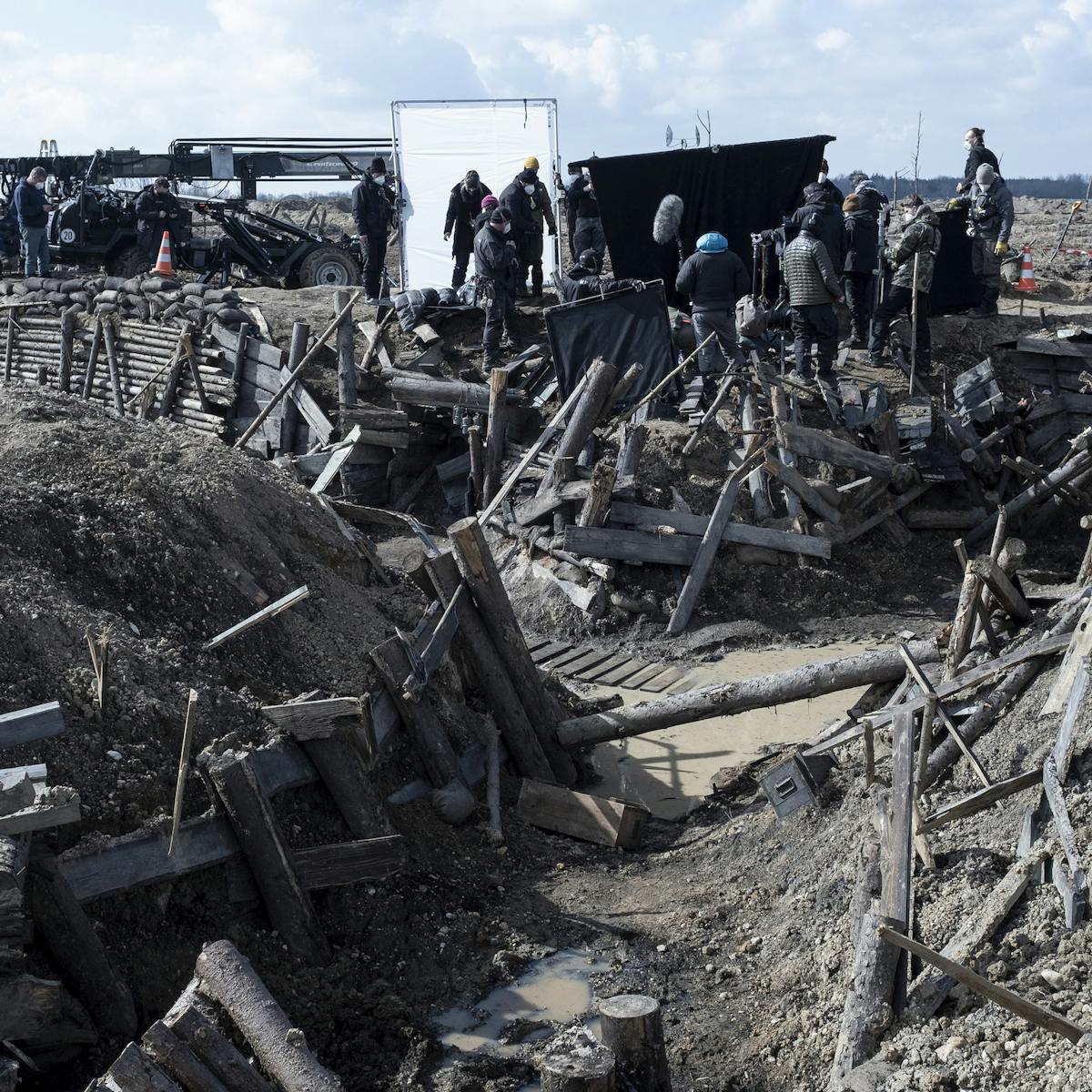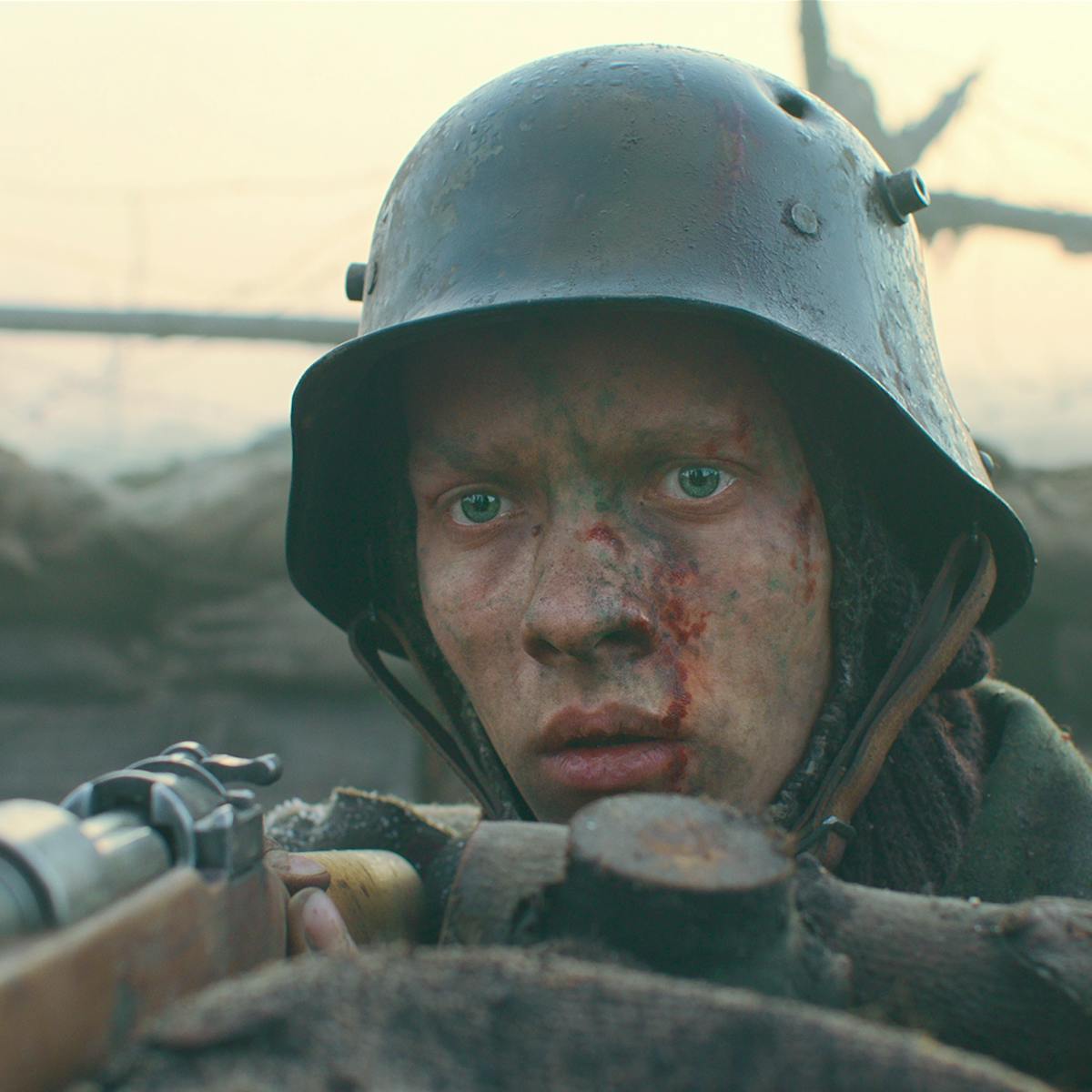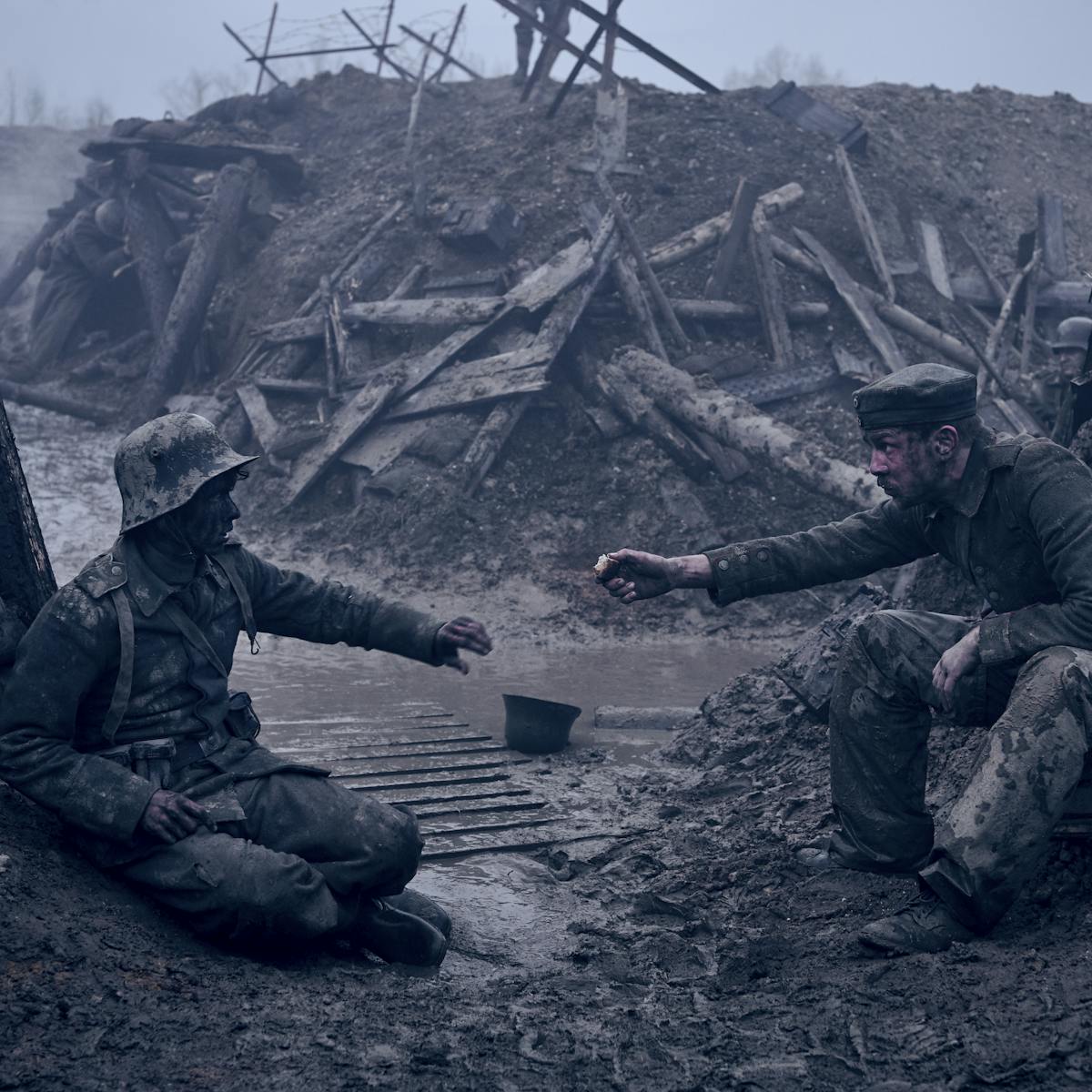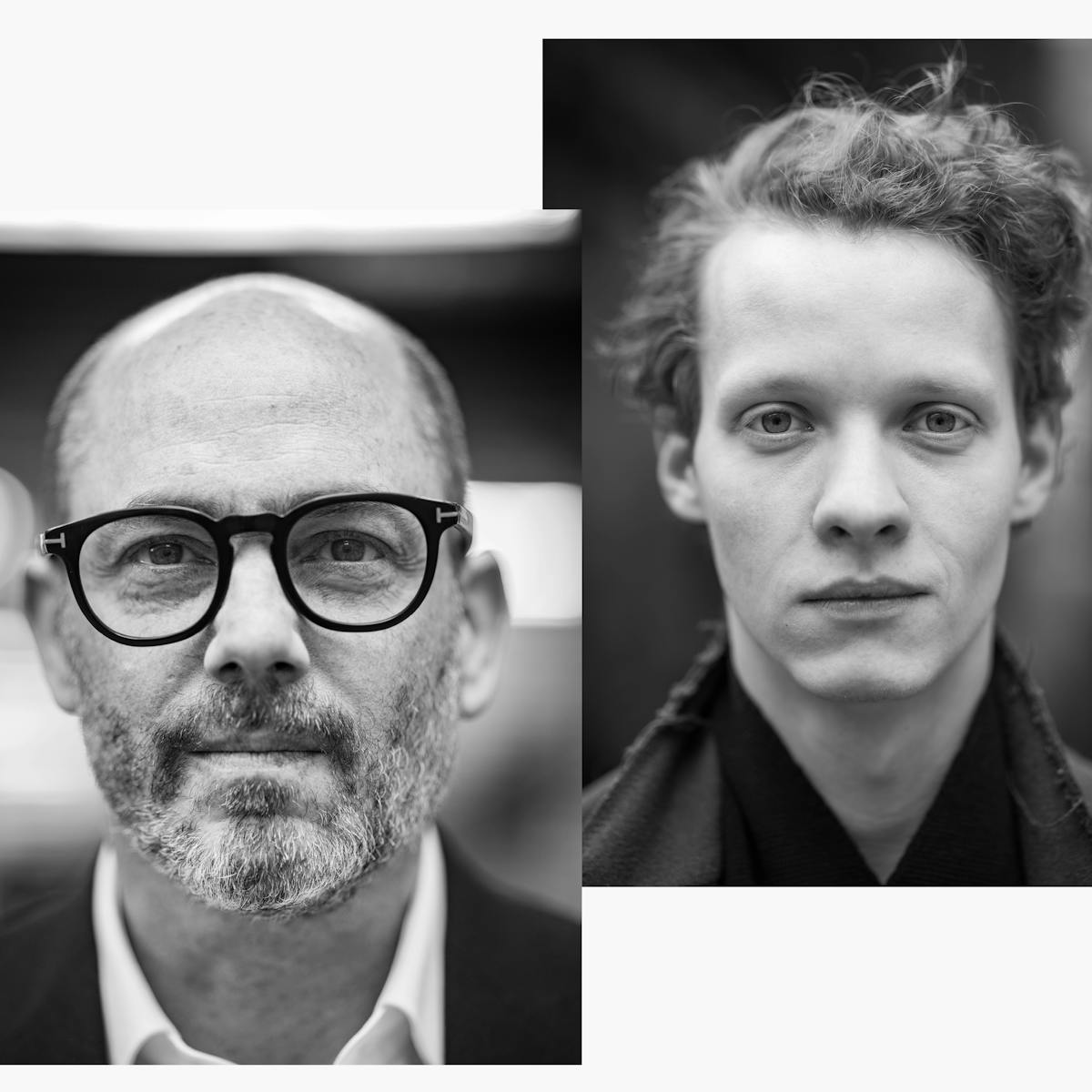The actor talks playing Paul Bäumer, and some of the remarkable crafts behind the first German adaptation of the anti-war classic.
The novel All Quiet on the Western Front has seen many translations, adaptations, and awards over its almost hundred-year lifespan. However, writer-director Edward Berger’s most recent take on the anti-war epic offers a visually beautiful, heartbreaking reminder of how timeless Erich Maria Remarque’s 1929 novel actually is. Berger’s adaptation, which he co-wrote with Lesley Paterson and Ian Stokell, has broken a number of records and earned an enviable list of nominations, including in nine Oscar categories and 14 BAFTA categories, seven of which they won, making it the most nominated and winning film of the 2023 BAFTAs.
At the heart of Berger’s All Quiet on the Western Front is protagonist Paul Bäumer, played by Felix Kammerer. Bäumer’s initial excitement about enlisting in the First World War is quickly quelled by the agonizing reality of life on the western front. Portraying Paul, one of the more established literary characters of the past century, was no easy feat: Kammerer had to endure weight training in freezing temperatures, filming while sporting a 90-pound uniform soaked in mud and water, and tackling emotionally intense scenes for days on end. But what’s most impressive about Kammerer’s take on Paul is that this was the actor’s first-ever film role.
Kammerer has been acting since he was young. Born in Vienna, Austria, he started out with the Hӧrbiger Youth Ensemble from 2013 to 2015, where he played Mercutio in Romeo and Juliet, among other roles. He then trained at the Ernst Busch Academy of Dramatic Arts in Berlin, where he first read Remarque’s novel and performed at a range of venues, including at the Maxim Gorki Theater, where he played Z in Jugend ohne Gott. Kammerer’s stage performances earned him the role of Paul: Dramaturge Sabrina Zwach was so impressed by his work as a permanent member of Vienna’s Burgtheater ensemble that she passed his name along to husband and All Quiet producer Malte Grunert.
In Kammerer’s turn as Paul, for which he was longlisted for the Best Actor BAFTA, his range is remarkable — from rosy-cheeked patriotism to unimaginable hopelessness — and he maintains subtle grace throughout almost two and half hours of brutality. Even though it was his first time in front of a camera, he did not shy away from the difficult material and filming conditions. “There is a point that you get so involved in a situation,” Kammerer says. “It’s this flow moment when you have the impression you are being acted and you’re not acting yourself. Something takes over.”
For Queue, Kammerer talks through a few of the film’s most impactful scenes, detailing his preparation and highlighting the remarkable Oscar-nominated crafts behind All Quiet on the Western Front.
Paul Bäumer (Felix Kammerer)
Brookie McIlvaine: How did you find your way to this role?
Felix Kammerer: I got the part in September 2020, and then I immediately started preparing. For about half a year [I studied] videos, pictures, audio files that are extremely rare from that time — there is no original sound, but you can find some computer reenactments of sound from artillery just a year after the war. I read around two and a half thousand letters from soldiers to their families. I read loads of books about war and about military tactics. I had a fake disengaged rifle sent to me by the production. I practiced disassembling and reassembling it all day. I sat with it on the couch and watched all the war movies I could get my fingers on, and while I was watching them, I was sitting there with my rifle. So it was a weird time to reflect on afterwards.
How has it felt since this movie’s been out in the world?
FK: It’s really unbelievable, especially because it’s my very first movie and I have no experience with filmmaking or the whole process afterwards, with awards especially. To remember [myself] just two years ago, a naive young actor doing his first film role, sitting in the mud, and now sitting in London and preparing for BAFTAs and Oscars, with so many nominations — the first German movie ever to be nominated for Best Picture at the Oscars — it’s really unbelievable.
What was your personal connection to the book and its adaptations prior to filming?
FK: I read the book the first time when I was studying acting in Berlin. But while preparing, I read it three or four times again, and really dived into it. So I had some idea, but what it really means and what the novel really is, obviously changed a lot during preparation.
The first scene I’d love to talk about is when Paul and his friends get their uniforms. You communicate Paul’s shift in attitude toward the war so well. How did you prepare to play these different sides of one character?
FK: You have the script in front of you and you try to prepare as best as you can. You see the evolution of the character from naive, wanting to go to war, to the end when nothing of this is left. You search for the pivoting point where it all changes. I found multiple points and I couldn’t decide, so I made it into a multiple-step program. The more boxes you check in this development, the stronger the feeling appears. That’s quite practical because then you don’t have to shoot it chronologically.
What was it like getting into costume and working with costume designer Lisy Christl?
FK: Lisy is absolutely the greatest. She has become a friend and she’s amazing, but [the costumes]she put on us, I dare her to try again. The uniforms were made of felt — the real fabric they used back in the First World War. This material can absorb up to 80 percent of its own weight in water. So when you put on the costume, it’s already quite heavy, and then you have the equipment and it gets heavier, and then you get into the trenches and the mud sticks to you and the water fills up your boots, and then the felt sucks up the water. After the first week, we weighed the costumes and the whole thing, without equipment, weighed about 90 pounds. There was a scene in this crater, and during the takes, I had to get out so they could dry me. The water was filling up everything [I was wearing] and we needed four people to pull me out because I was sinking into the mud, weighing around 160 pounds. We were running for 16 hours a day in knee-deep mud behind tracking vehicles with 600 extras around us, explosions, and we always had temperatures around the freezing point. The warmest it ever got was maybe 38 degrees Fahrenheit.
How did you create such a realistic bond onscreen with Moritz Klaus, Aaron Hilmer, and Adrian Grünewald, who play the characters Albert, Franz, and Ludwig, Paul’s classmates and friends who are also enlisting in this scene?
FK: We became real friends. A shout-out to our amazing casting director, Simone Bär, who sadly died just recently. She did such an amazing job, and I’m really devastated for her not to see this unbelievable journey because it’s thanks in huge part to her. I think the movie wouldn’t have become [what it is] without these characters; you have to find people who fit. We had the luck to live in the same house in Prague, but because of COVID we were not allowed to see each other.
Paul Bäumer (Felix Kammerer) and Stanislaus Katczinsky (Albrecht Schuch)
The next scene is when Paul and Kat, played by Albrecht Schuch, steal a goose, and then you read Kat’s wife’s letter to him. What was it like working with Albrecht and developing that onscreen friendship?
FK: Working with Albrecht is an absolute gift. We connected very well because he also comes from theater. So we bonded quite quickly and developed some kind of brotherly, maybe father and son, kind of relationship. That scene with the letter on the toilet was one of the most beautiful shooting days of all because it was warm, it was sunny, we were dry, and we could just sit there for six hours and talk. You could just go back to the essence of acting, really looking each other in the eye and talking to each other, listening and feeling. When we finished that scene, we went back to the other set and the other boys said, “What happened? You look like you came from a spa or like you have meditated.” We were so happy. We were absolutely in heaven.
How did you develop your character’s home life and personality outside of his identity and life in the army?
FK: There is none. I did not create any backstory for him because we don’t see it and we don’t need it. The thing that interests us is this person, his way of seeing things, which is independent from his private life. It’s about his relationship to his friends. We also see, quite shortly after the beginning, it’s about the loss of his connection to his family. So I felt it would be best to just get rid of the family. Because if you go to war, if you really have to detach from your life back in the real world, then it might be helpful to just not have one.
There’s only one thing I had as a backstory — I think I never told anyone. It’s that Paul has just come out of his very first relationship shortly before he goes to war. It helped to have a failed love story, and that Paul maybe thinks about this first love and what will happen to her after he dies. I knew there was a love and I knew the name of this love, but nothing more. It adds just a little detail to some scenes.
Paul Bäumer (Felix Kammerer) and fellow soldiers
Next is the “march” scene, where the soldiers are sent out on the battlefield for the first time. Your skin is a barometer for how Paul changes here. What was your process with the hair and makeup team every day?
FK: I had a lot of ideas before coming to set for the first time. But when I arrived there, I realized, Just let them do their thing. You realize it’s maybe better to let this makeup happen to you, just like it happens to Paul. It’s not my decision what happens to my face — the mud, the blood, the wrinkles, the cuts. I went to makeup every morning at around four or five o’clock in the morning, and I closed my eyes, and when I opened my eyes again, there it was. So it was also a surprise for me every day, just like for Paul.
To prepare for these action scenes, what kind of physical and weapon training did you do?
FK: I was running with a weight vest for about four months, nearly every day with 10 kilos, just to build up stamina, to gain muscles. I was running through the snow, through the rain, I think it was maybe two degrees Celsius; it was always about the freezing point. There is something called HIIT training, high-intensity interval training — I did a lot of that. After half a year, suddenly there was some kind of character and it felt like a little draft. After we visited the set for the very first time, it really came alive. I think it was the fourth shooting day when we shot one of the last scenes where the soldiers get forced into battle one last time. That day was the first time where I went into character at a later point in the movie, and I felt, Okay, now Paul is here. Now, I’ve met him.
What was the process of choreographing these large battle scenes? What kind of direction did you get from Edward Berger?
FK: The battle scenes are extremely complicated, choreography-wise. It depends a lot on where you can step because of the explosions, where you have to run, how close you have to be to the camera, and all these technical aspects. These technical things give you some sort of direction. So I know, Okay, we are going to run at this pace and we are going to stop here. I get this information and I try to imagine, Why do I need to stop here as Paul? And that’s a quite intuitive and spontaneous process.
What was it like filming these scenes that had really heavy visual effects?
FK: Luckily, we were not shooting anything in a green room. I’m so glad we did it out there in the real environment with real explosions. Most of what you see in the battle scenes is practical [effects] and is enhanced by our amazing visual effects team. So when there is an explosion, there really was an explosion, maybe not as big as on the screen, but we felt the pulse, we felt the detonation, we heard it. Our rifles shot blanks. You smelled the smoke and you smelled the fire from the flamethrowers, and you felt the heat and it was really near and close and raw. That helped contribute to this amazing piece, to immerse yourself.
Paul Bäumer (Felix Kammerer) and a French soldier
The scene in the crater with the French soldier was excruciating. Did you do anything to protect your mental health throughout filming, either individually or as a crew?
FK: Well, I’m a big opponent of method acting. That’s not what I think acting is about and what I want to do as an actor. I want to act, not to be. I really try to separate myself and the character, which helped in this case, obviously. We shot the crater scene for two days, and I was done after that. But at the same point, it’s really rewarding when you feel, Now I really get to see the core of the character. When we were shooting that scene, I did see the core of the character for the very first time. I loved it.
How did working in front of a camera versus onstage affect your performance?
FK: In theater, you start at point A and end at point B. Your character goes through the whole process. But with film, you work different scenes at different stages. That was completely new to me. I came up with this system with an Excel spreadsheet to coordinate levels of energy. In the end, it looks like a tax refund sheet, but what you see is the evolution of the character. You can put your finger on that and say, “Okay, today we’re shooting Scene 25 and the levels are as follows.” You turn your little knobs and you engage the machine and then you’re ready. I do it for every film role. It saves a lot of time and it’s really reliable because your work gets very technical, and it sets quite straight boundaries. That gives you a lot of freedom to just act.
My last question: What makes All Quiet timeless?
FK: It’s essential. It’s like every story that is existential: It’s about all of us and because the stakes are so high and the story is so universal, it touches all of us and we feel heard, even if we don’t know war personally. That makes it properly one of the most timeless stories that has ever been written.



